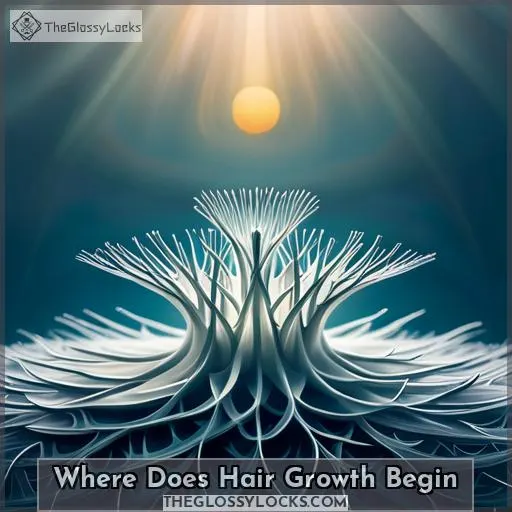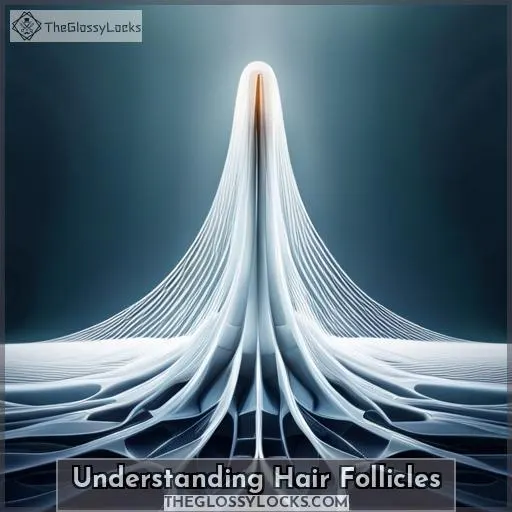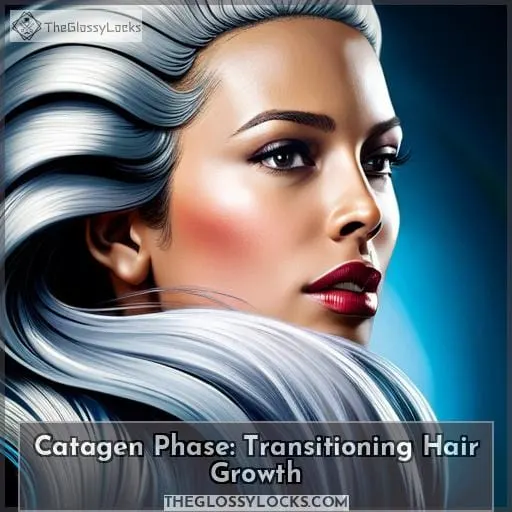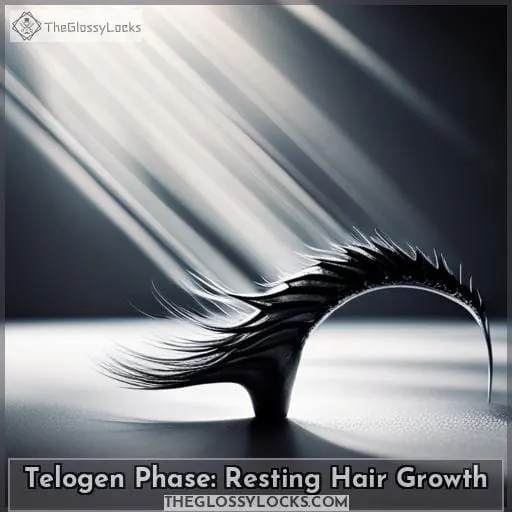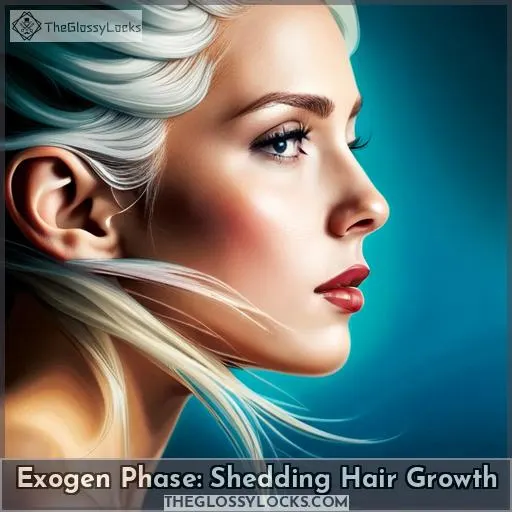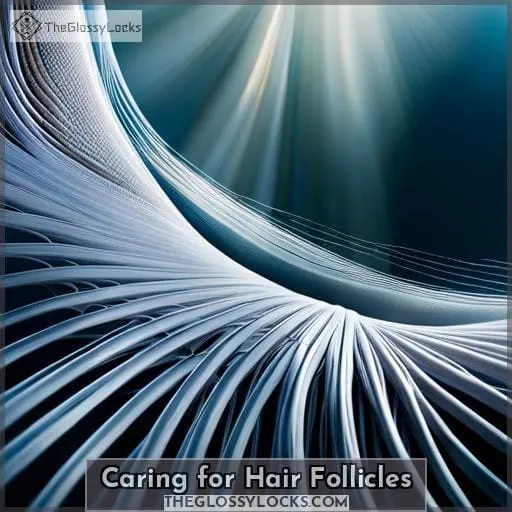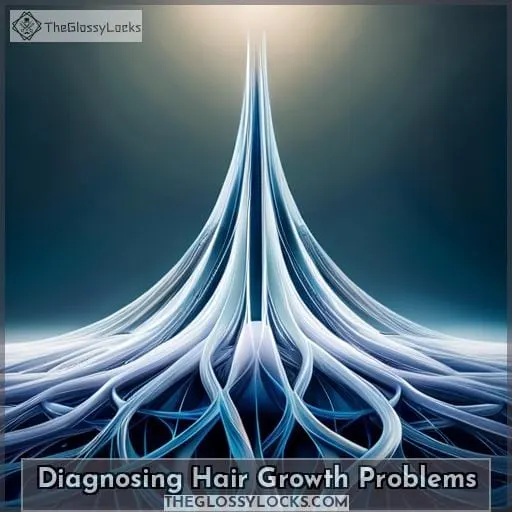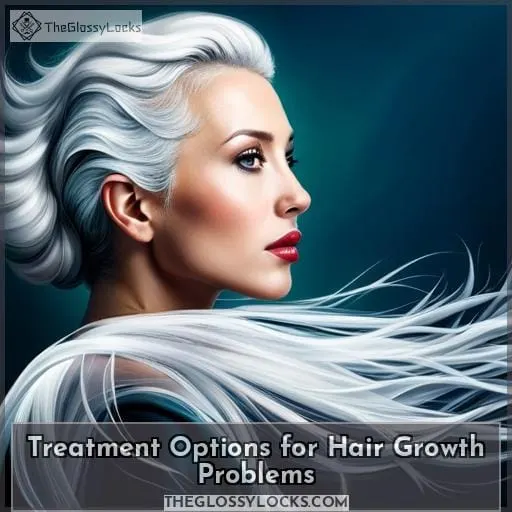This site is supported by our readers. We may earn a commission, at no cost to you, if you purchase through links.
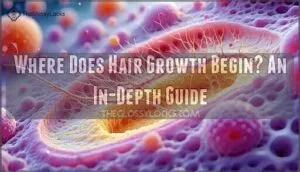
So if you want to learn more about how they work and how to keep them in top condition for optimal results, read on! We will explore the different phases of hair growth cycles and provide insight into factors influencing its development along with tips on how to care for those follicles.
Table Of Contents
- Key Takeaways
- Understanding Hair Follicles
- The Hair Growth Cycle
- Anagen Phase: Where Hair Growth Begins
- Catagen Phase: Transitioning Hair Growth
- Telogen Phase: Resting Hair Growth
- Exogen Phase: Shedding Hair Growth
- Factors Affecting Hair Growth
- Caring for Hair Follicles
- Diagnosing Hair Growth Problems
- Treatment Options for Hair Growth Problems
- Frequently Asked Questions (FAQs)
- Conclusion
Key Takeaways
- Hair growth begins with healthy follicles in the scalp.
- Nutritional deficiencies and lack of proper care can cause premature hair loss conditions.
- Proper scalp care, including using suitable shampoo and conditioner, treating gently, and avoiding hot water, protects against damage caused by styling tools and harsh products.
- Treatment options for hair growth problems include medications, laser therapies, surgical procedures, PRP injections, scalp care, and home remedies.
Understanding Hair Follicles
Understanding your hair follicles is key to maintaining healthy, strong hair growth — and it starts with knowing the basics.
Hair follicles are microscopic structures within the skin that grow each strand of our hair. They cannot be pulled out, and damaged follicles lead to hair loss or reduced growth.
Keeping them healthy should always be a priority for preventative care as they are responsible for producing new blood vessels and nervous system neuron cells when healing from injury or illness.
Hair grows in cycles consisting of anagen (growth), catagen (transition), telogen (resting) phases, and exogen phase (shedding). Each individual cycle has its timeline, which can vary depending on age, nutrition levels, health status, etc.
Eating a balanced diet rich in protein will help promote regular maturation of hairs while vitamins such as D, C, iron, zinc, folic acid, and vitamin B12 all play important roles too.
Reducing stress is another way we can prevent premature conditions like baldness. Proper scalp care, including using suitable shampoo and conditioner, treating gently, avoiding hot water, also helps protect against damage caused by styling tools and harsh products.
If you find yourself experiencing faster than usual shedding, then please consult with a doctor as soon as possible.
The Hair Growth Cycle
Your hair’s growth is like a roller coaster ride, with anagen, catagen, telogen, and exogen phases, each with its own timeline. To keep your follicles healthy and promote hair growth, it’s important to take care of your scalp with the right shampoos and protective equipment when necessary.
Eating a balanced diet full of vitamins D, C, iron, zinc, folic acid, and B12 can help nourish both the underlying condition as well as provide activity for the follicles. Reducing stress levels is also essential in preventing premature loss of hair or thinning from occurring.
It’s equally important not to pull on your locks too hard when brushing them out nor excessively use hot water while shampooing – towel-dry gently instead! Hair accessories should fit comfortably too so you don’t strain any strands either accidentally or intentionally throughout styling sessions.
Lastly, always talk to a doctor if you notice faster than usual shedding so they can investigate any underlying cause before further damage takes place.
Anagen Phase: Where Hair Growth Begins
Dive into the Anagen Phase and unlock your hair’s potential! The anagen phase of the hair growth cycle is when new hairs start to grow, replacing older hairs. It typically lasts between two to six years depending on individual genetics and environmental factors.
During this stage, follicles are actively dividing cells which help create individual hairs that will eventually mature and emerge from your scalp. It is important to keep in mind that everyday stressors can affect a person’s regrowth potential by damaging their follicle health or disrupting their natural growth cycle.
Therefore, it’s essential for individuals looking for healthy hair regrowth to manage stress levels as much as possible while also incorporating good nutrition into their daily routine. This includes vitamins D & C, iron, zinc, folic acid, and vitamin B12 – all of which are key components in achieving optimal results during this critical period of regeneration.
Additionally, taking proactive steps like using protective equipment when exposed to harsh elements, gentle towel-drying after shampooing/conditioning sessions, along with lighter styling techniques goes a long way towards ensuring optimum protection against any external damage throughout the entire process.
Catagen Phase: Transitioning Hair Growth
As you transition to the catagen phase of hair growth, make sure to nourish your follicles with proper nutrition and reduce stress for healthy results. To achieve this, start a cleansing regimen that utilizes natural hair care products such as shampoos and conditioners.
Additionally, take vitamin supplements like Vitamin D or C for added nourishment. Furthermore, stress management is hugely important in preventing premature hair loss. Try activities like yoga or meditation if you are experiencing high levels of stress.
Finally, remember to include folic acid in your diet, which helps promote strong cell regrowth during the catagen phase transition.
Telogen Phase: Resting Hair Growth
You enter the telogen phase of hair growth, a resting period marked by follicles ceasing activity. This is typically the longest phase in the cycle and can last anywhere from two to four months. During this time, your hormone levels are regulated, and any damage to follicles can begin repairing itself.
The telogen stage also gives you an opportunity to maximize healthy hair growth and control cycles by exploring symptoms such as blemishes or bumps on the scalp that may indicate infection or wound healing needs attention.
In addition, preventing excessive pulling of hairs during this stage helps keep them strong for when they shed naturally in its final days before transitioning into exogen stages where new hairs grow again from damaged follicles.
By taking care of your scalp health through proper nutrition, stress reduction techniques, and gentle cleaning habits, you’re giving yourself a chance at healthier, longer-lasting strands with fewer split ends along their length for better-looking locks overall!
Exogen Phase: Shedding Hair Growth
Experience the Exogen Phase of your hair cycle and witness how it sheds old hair for new growth. This phase is important in follicle repair and helps protect your hair against damage. Stress management, as well as a healthy diet with key nutrients such as Vitamin C, Zinc, Folic Acid, Iron, and Vitamin B12, can help prevent premature hair loss or thinning at a faster rate than given time allows naturally.
Mayo Clinic suggests different types of foods to eat that promote healthy growth, including lean proteins like fish or beans, dark green vegetables, nuts & seeds, whole grains, and fruits & juices rich in antioxidants like berries or citrus fruits.
These foods support scalp circulation leading to thicker strands over time due to lower stress levels.
Incorporating protective care measures while styling can also reduce breakage from heat tools for healthier-looking locks!
Factors Affecting Hair Growth
You may have noticed that as you age, your hair growth changes. Factors such as nutrition, health, and stress all play a part in determining how fast and healthy your hair grows. Age is an important factor that affects the rate at which new hairs are produced by the body’s follicles.
Proper nutrition can improve blood circulation to help nourish those follicles for optimal growth.
Health also matters when it comes to hair growth. Hair loss can be caused by conditions like alopecia or hormonal imbalances from illnesses such as thyroid disease or diabetes.
Age
Feel the difference in your hair as age advances: thicker strands due to lower stress, and healthier-looking locks from protective styling measures. Hair growth is affected by age through distinct phases that comprise a healthy growth cycle.
Nutritional deficiencies and lack of proper care can cause different premature hair-loss conditions in people of all ages. Stress management and proper hair care regimens are important for maintaining healthy follicles over time.
Medical treatments may be necessary to restore single hairs or longer periods of thinning/hair loss related to aging processes.
Nutrition
Enjoy the benefits of good nutrition for your hair and scalp health. Essential vitamins, minerals, and proteins can help promote healthy follicles over time. For optimal growth, nutrient absorption must be at its best. Protein intake is key to maintaining strong strands, while folic acid helps with cell division in the scalp.
Vitamin D aids in stimulating new growth, while Vitamin C helps keep hair texture soft and supple.
Where does hair growth generally begin? It’s actually a simple process that starts deep within the skin. The dermis layer contains many tiny structures called follicles, where each strand begins its journey into greatness! With great depth comes great responsibility.
Health
Take care of your follicles and you’ll be rewarded with healthy hair growth! Mental health plays an important role in maintaining the strength of your hair. Stress can cause premature hair loss or damage to existing follicles, so taking time for yourself is essential.
Scalp care is key – use mild products and avoid pulling on hairs too hard when styling them. Eating a balanced diet full of nutrients like Vitamin D, C, iron, and zinc helps promote strong follicle development.
Using the right kind of shampoo/conditioner can help keep things from drying out or becoming brittle, which leads to breakage and further damage.
Hair loss due to poor nutrition or lack of proper care should not be ignored. Seek medical advice if experiencing faster-than-normal shedding, as this could signal underlying issues that need addressing quickly before any permanent follicle damage occurs!
Stress
Manage your stress levels to maintain strong follicles and healthy hair. Reducing stress can prevent premature hair loss conditions, such as thinning or baldness. Proper care for the scalp, including choosing the right shampoo/conditioner and treating hair gently with little heat, is important for preventing damage from occurring to vulnerable strands while wet.
A healthy lifestyle also supports growth. Eating a balanced diet with enough protein helps keep follicles functioning optimally and encourages new growth when damaged or impaired by injury. Additionally, avoiding pulling on hair strands too hard reduces tension that may lead to breakage over time.
Caring for Hair Follicles
Proper hair care, good nutrition, and reduced stress are key factors in caring for your hair follicles. This is where the growth of healthy hair begins. With a range of treatments available to help nourish and protect them from damage caused by environmental pollutants or other stresses on the scalp, you can ensure your follicles remain strong and ready to produce new strands of beautiful locks.
Taking time out for yourself with regular exercise routines that reduce overall stress levels, as well as balanced diets full of essential vitamins, will provide additional benefits to maintain healthier and fuller-looking tresses throughout life.
Proper Hair Care
Treat your hair and scalp with care to keep follicles healthy and promote growth. Regular trims help encourage new growth, while protective styling protects existing hair from breakage. To maintain scalp health, massage natural oils into the skin using gentle circular motions.
This helps stimulate blood flow for healthier follicles. Additionally, regular scalp massages can reduce stress levels, which are linked to premature thinning or loss of hair. To protect against heat damage when drying wet strands, use a lower temperature setting on tools such as blow dryers.
Good Nutrition
Getting the right nutrients is essential for encouraging healthy follicle growth and maintaining a strong, beautiful head of hair. Beyond genetic predisposition, there are home remedies and lifestyle changes that can help promote healthier follicles.
Vitamin D, C, Iron, Zinc, Folic Acid, or B12 all play an important role in supporting good follicle health, as well as reducing damage to your hair from heat styling tools or harsh chemicals.
Eating a balanced diet with these key vitamins is not only necessary for overall wellbeing but also helps keep your scalp hydrated, which contributes further to improved hair quality over time.
Reduced Stress
Reducing your stress levels can help prevent premature hair loss and ensure healthy follicle growth. Curbing anxiety with mindfulness, positive thinking, and stress-relieving activities is key to managing chronic tension.
To promote optimum hair health, create a daily routine that includes regular exercise or meditation to relax the mind and body. Spending time outdoors in peaceful surroundings helps reduce cortisol levels naturally.
Engaging in enjoyable hobbies like reading or painting helps keep worries at bay.
Diagnosing Hair Growth Problems
Now that you know how to care for and protect your hair follicles, it’s important to understand when something may be wrong. Diagnosing any issues with your hair growth can help you get the treatment that best suits your needs.
Symptoms of a problem in the follicle include pimples, fluid-filled bumps, blemishes, swelling, or an itchy rash on the scalp. These symptoms may indicate infection if accompanied by a yellow crust or leaking fluid.
To diagnose these conditions and determine appropriate treatments, tests like blood work and biopsy are needed, along with pull & tug testing to stimulate new growth from existing follicles.
Additionally, utilizing products containing nutrients such as Iron, Zinc, Folic Acid, Vitamin D, Vitamin C, and B12 will help promote healthy functioning of those affected areas.
If you’re experiencing more rapid than normal balding, it’s important to speak with a doctor who specializes in this field. There could be underlying causes beyond just damaged or injured follicles, such as genetic factors contributing too.
Treatment Options for Hair Growth Problems
Treating your hair growth problems starts with understanding the various options available to you. From home remedies and scalp care to medical treatments, there are many ways that can help improve follicle health.
- Hair Loss Treatments: There is an array of treatments available for those suffering from hair loss or thinning. These include medications such as Propecia and Rogaine, laser therapies like low-level light therapy (LLLT) and microneedling, surgical procedures like scalp reduction surgery or transplantation, PRP injections which use platelet-rich plasma derived from your own blood, and certain herbal medicines advocated by Ayurvedic practitioners in India.
- Scalp Care: Proper hygiene is essential for healthy hair growth as it helps prevent infections that damage follicles over time. Using mild shampoos formulated specifically for the type of scalp condition present on your head will maintain its pH balance while removing dirt buildup caused by sweat glands or environmental pollutants without stripping away natural oils needed for nourishment. Also, be sure to massage regularly with appropriate oils so nutrients reach deep into skin layers where new cells grow best!
- Home Remedies & Nutrition: Eating foods rich in vitamins A, B12, C, D3 & E along with zinc & iron can make a huge difference when it comes to promoting healthy tresses naturally at home. Plus, adding omega 3 fatty acids such as flaxseed oil, coconut milk/oil, etc., helps keep hairs strong! In addition, daily massages using warm olive/castor oil infused herbs stimulate circulation, thus aiding new cell regeneration within follicles resulting in thicker strands over time.
By following these tips, one can ensure better results when dealing with any kind of issues related to their mane! Whether this means trying out different products until you find what works best, consulting a trichologist if symptoms worsen, or opting for professional services depending on severity – all these should be taken into consideration before deciding on how much effort needs putting towards restoring damaged locks back to life again!
Frequently Asked Questions (FAQs)
What nutrients are important for healthy hair growth?
Vitamins D, C, and B12, iron, zinc, and folic acid are key nutrients for healthy hair growth. Eating a balanced diet packed with these vitamins can help promote strong follicle development and reduce the risk of premature loss.
Stress reduction also plays an important role in maintaining optimal hair health.
How can I reduce stress to prevent hair loss?
To reduce stress and prevent hair loss, try practicing mindfulness, taking breaks to socialize and relax, exercising regularly to release endorphins, getting enough sleep each night, and eating a balanced diet.
How can I keep my hair follicles healthy?
To keep your hair follicles healthy, take care of your hair and skin, eat healthy foods rich in protein, reduce stress levels, use protective equipment when necessary, and avoid pulling or tugging on your hair.
How long does it take for damaged follicles to grow back?
It typically takes up to four years for damaged follicles to regrow. To keep them healthy, care for your hair and skin, eat nutritious foods, reduce stress, and wear protective gear when needed.
What should I do if I’m experiencing faster hair loss than usual?
If you are experiencing faster hair loss than usual, consult a doctor. Eat healthy foods with essential nutrients for hair growth, reduce stress, and treat your hair gently.
Conclusion
Your hair is an important part of your identity, and it’s essential to make sure it’s looked after. Understanding the hair growth cycle and the factors that affect it can be complex, but it can help you maintain healthy follicles and keep your hair looking its best.
With the right care and nutrition, you can ensure your hair is healthy and growing. However, if you experience faster hair loss than usual, it’s important to seek medical advice. Remember, prevention is better than cure, so take the time to nurture your hair, and you’ll be rewarded with a beautiful, lush mane.

